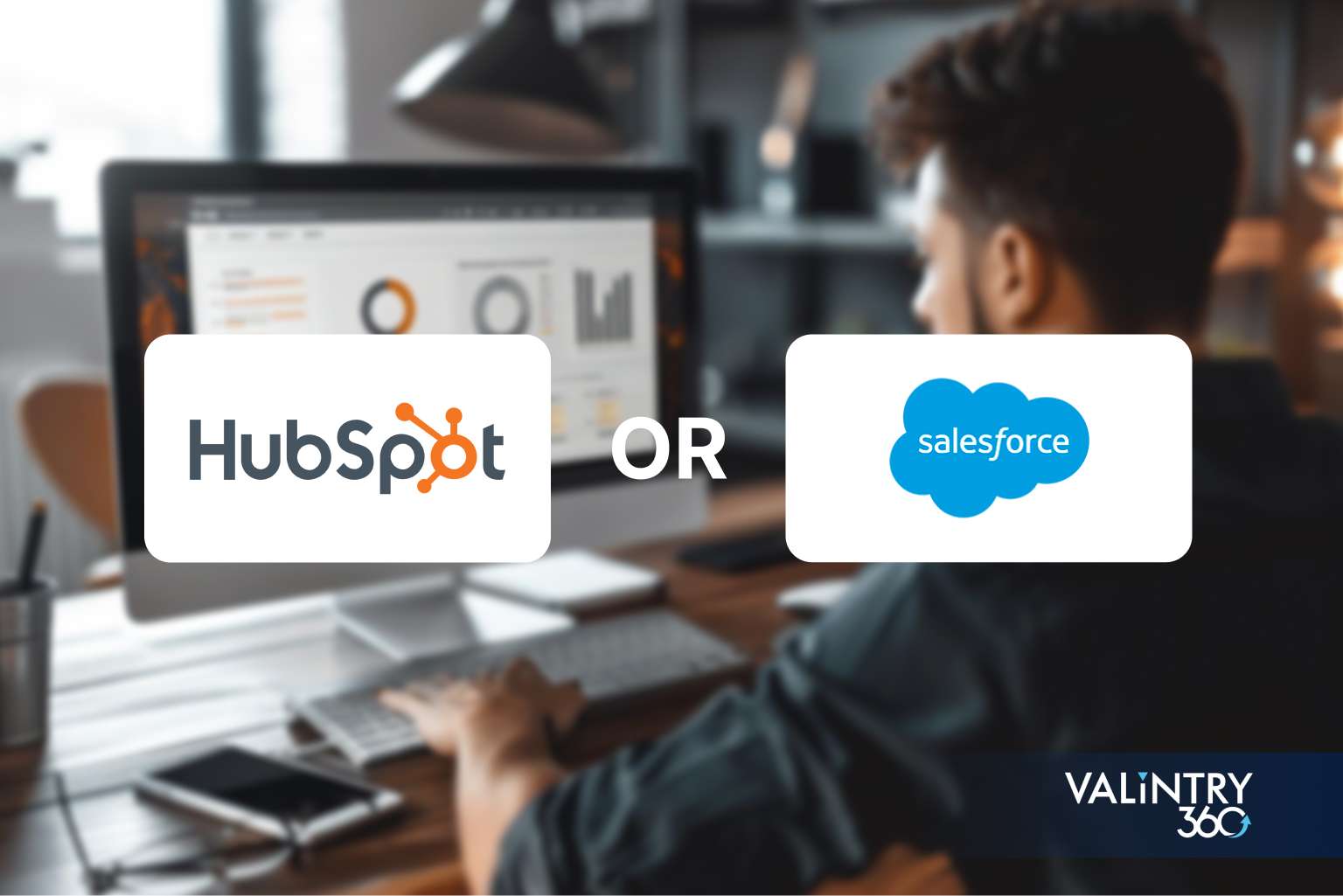
Overview

Both HubSpot and Salesforce dominate the market with their powerful tools, making them go-to choices for businesses looking to optimize operations. Whether you’re managing customer relationships, automating marketing efforts, streamlining sales pipelines, or building a fully integrated digital workspace, both platforms offer top-tier solutions designed to supercharge productivity.
With such impressive capabilities, choosing between HubSpot and Salesforce isn’t just a matter of preference—it’s about finding the right fit for your business goals. To help you decide, we rigorously tested both platforms, comparing their strengths, weaknesses, and unique features. By the end, you’ll know exactly which can improve your team’s efficiency.
HubSpot vs. Salesforce: A Quick Comparison

When evaluating HubSpot and Salesforce, it’s essential to understand their origins. HubSpot Marketing started as an inbound marketing tool that expanded into CRM, whereas Salesforce began as a CRM powerhouse and has continuously evolved with advanced sales and marketing automation.
Today, HubSpot and Salesforce offer comparable features, but their core strengths set them apart:
- CRM with robust automation
- Sales forecasting and advanced analytics
- Customer service and support tools
- Lead and contact scoring
- Integrated VoIP and communication features
- Comprehensive marketing automation
While HubSpot Marketing provides solid inbound tools, Salesforce Sales Cloud delivers a far more comprehensive, scalable, and customizable solution—perfect for businesses looking to optimize B2B sales processes. Unlike HubSpot’s all-in-one approach, Salesforce’s modular system allows you to expand functionalities precisely, ensuring you only pay for the features that align with your needs.
To keep this comparison fair, we’ll use Salesforce Sales Cloud as the baseline, exploring how it compares to HubSpot and why it remains the preferred choice for high-growth businesses. Stay tuned for an in-depth breakdown of the core differences that matter most to your bottom line.
| Salesforce | HubSpot | |
|---|---|---|
| Sales Reporting & Forecasting | Offers robust reporting and forecasting tools, but the most sophisticated features require higher-tier plans. | Industry-leading analytics and forecasting tools right from the baseline plans, easily scalable for B2B companies managing long or multi-stage pipelines. |
| Marketing Features | Renowned for HubSpot Marketing; inbound methodologies are deeply ingrained, making it simple to launch campaigns and track ROI even with entry-level plans. | Salesforce Sales Cloud can be augmented with powerful marketing tools (e.g., Marketing Cloud) for full-funnel automation. Ideal for B2B companies needing multi-channel marketing at scale. |
| Ease of Use | Offers intuitive, step-by-step onboarding and a unified interface. Suitable for teams with minimal technical background. | Provides sandbox-style demos and thorough training resources. The ecosystem is vast, so initial setup can feel more involved. |
| Customization | Custom workflows and automation are easy to implement; support coding in JavaScript and Python for added complexity. | Extremely customizable—from tailored workflows to advanced coding capabilities—making it perfect for B2B enterprises with unique processes. |
| Pricing | Offers a free CRM with baseline features. Paid tiers (Starter, Professional, Enterprise) package product bundles for marketing, sales, and service. | Charges per user; you can start with a foundational Salesforce Sales Cloud plan and add apps or modules as needed. |
| AI Features | Offers AI-driven suggestions, predictive analytics, and content generation features in mid-tier and above. | Einstein and Agentforce deliver generative AI, workflow automation, predictive scoring, and more. Built to scale with your business; advanced features can be integrated based on your specific use cases. |
The most significant difference between HubSpot and Salesforce lies in their scalability and customization capabilities. While both platforms offer powerful CRM tools, Salesforce Sales Cloud provides an enterprise-grade, highly customizable solution tailored for B2B businesses with complex sales cycles.
Choosing the right CRM depends on your business’s long-term vision—if you need a flexible, scalable system that grows with your team and adapts to your unique processes, Salesforce is the clear winner.
Why Salesforce CRM is Better for Small-Medium Sized Businesses

Your sales team is working overtime, leads are pouring in, but revenue isn’t budging. Sound familiar? Over 70% of sales teams miss their targets, often because they’re focused on activity rather than outcomes. The solution? Measuring and improving sales efficiency.
Your sales team is working overtime, leads are pouring in, but revenue isn’t budging. Sound familiar? Over 70% of sales teams miss their targets, often because they’re focused on activity rather than outcomes. The solution? Measuring and improving sales efficiency.
1. Scalability Without Limits
- Many SMBs start small but plan for long-term growth. While HubSpot is easy to onboard, its features can quickly feel restrictive as businesses expand.
- Salesforce Sales Cloud is designed to grow with your business, offering more advanced automation, analytics, and integrations as your needs evolve.
- No need to switch CRMs as you scale—Salesforce adapts to your growth without requiring a platform migration.
2. Advanced Sales and Pipeline Management
- SMBs often face longer and more complex sales cycles as they scale, requiring deeper insights into customer interactions.
- Salesforce Sales Cloud enables SMBs to build highly customized sales workflows, automate repetitive tasks, and gain real-time visibility into every stage of the pipeline.
- AI-powered forecasting and automation help smaller teams close deals faster, making them more competitive against larger enterprises.
3. Deeper Integrations for a Unified Tech Stack
- Unlike HubSpot, which operates as an all-in-one but sometimes limited ecosystem, Salesforce integrates seamlessly with thousands of third-party applications and business tools.
- SMBs using tools like Slack, QuickBooks, Shopify, Google Workspace, or Microsoft 365 will benefit from Salesforce’s robust API and app ecosystem.
- These integrations help businesses centralize data, reduce manual input, and improve operational efficiency across departments.
4. Greater Flexibility & Customization
- While HubSpot Marketing is strong in inbound marketing, Salesforce CRM excels in customizability across sales, service, and marketing.
- Small and medium businesses often have unique workflows and processes that require a CRM that adapts to them—not the other way around.
- With Salesforce Sales Cloud, SMBs can create custom dashboards, automated lead scoring, role-specific access controls, and tailored AI insights to match their exact needs.
5. Long-Term Cost Efficiency
- At first glance, HubSpot’s free CRM might seem like a budget-friendly option. However, as SMBs require advanced features, pricing escalates quickly due to bundled plans.
- Salesforce Sales Cloud offers a modular pricing model, allowing businesses to only pay for what they need while still having access to enterprise-grade capabilities.
- The higher return on investment (ROI) comes from increased automation, stronger sales performance, and the ability to scale without limitations.
Final Verdict: Why SMBs Choose Salesforce Over HubSpot
For small and medium-sized businesses looking beyond entry-level CRM solutions, Salesforce Sales Cloud is the best long-term choice. It provides unmatched flexibility, deeper integrations, and powerful automation—allowing SMBs to increase revenue, improve efficiency, and scale seamlessly.
If your goal is to grow your business without switching platforms later, Salesforce CRM is the clear winner.
Related Posts
What Roadmap Should Guide Your Salesforce Consulting and…
The race toward AI-driven operations is accelerating, but many organizations still face a hard truth: technology alone doesn’t create transformation. It amplifies what’s already there — including inefficiencies. For mid-market and enterprise leaders, the real question isn’t whether to adopt…
Measuring ROI from Salesforce Consulting and Solutions
For business leaders, ROI from Salesforce isn’t just about dollars spent — it’s about how well technology enables strategy. True return on investment comes when Salesforce doesn’t simply “run,” but becomes a growth engine that empowers teams, sharpens insights, and…
See How Salesforce Consulting and Solutions Reveal Hidden…
Many organizations have made significant investments in Salesforce but still wonder, “Are we truly getting the value we expected?” Benchmarking your Salesforce org is the process of measuring how well your data, processes, and teams align with business goals —…

